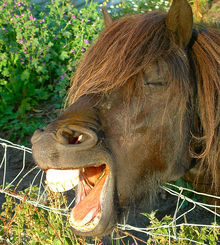A Bayer HealthCare Animal Health Brochure available through AAEP focuses on the fact that proper dental care for horses has its rewards. Your horse will be more comfortable, will utilize feed more efficiently, may perform better, and may even live longer because routine dental care is essential to your horse's health.

Horse dental care - Not a laughing matter
Your horse will be more comfortable, will utilize feed more efficiently, may perform better, and may even live longer because routine dental care is essential to your horse's health.
© 2015 by Rachel C
Periodic examinations and regular maintenance, such as floating, are especially necessary today for a number of reasons:
- The horse's diet and eating patterns have been modified through domestication and confinement.
- More is now demanded from performance horses, beginning at a younger age than ever before.
- Breeding animals are often selected without regard to dental considerations.
If a horse starts behaving abnormally, dental problems should be considered as a potential cause. Abnormalities should be corrected and teeth should be floated and maintained as indicated.
Most equine dental procedures, including basic floating, irreversibly change the horse's teeth and therefore are most appropriately performed by a veterinarian. If your equine practitioner finds a loose tooth, he or she may extract it. This may reduce the chance of infection or other problems.
Canine teeth, usually present in mature geldings and stallions, may be rounded and smoothed. This procedure is performed to prevent interference with the bit and to reduce the possibility of injury to the horse, the handler and other horses pastured or stabled with the horse.
Depending upon the condition of your horse's teeth, more than one visit from your equine practitioner may be required to get the mouth in prime working order.
It is important to catch dental problems early. Waiting too long may increase the difficulty of correcting certain conditions or may even make correction impossible.
The age of a horse affects the degree of attention and frequency of dental care required. Consider these points:
- Foals should be examined shortly after birth and periodically during the first year to diagnose and correct congenital dental abnormalities (existing from birth).
- Yearlings have been found to have enamel points sharp enough to damage cheek and tongue tissue. Floating will make them more comfortable.
- Horses going into training for the first time, especially 2- and 3-year-olds, need a comprehensive dental check-up. Teeth should be floated to remove any sharp points and checked for retained caps. Caps should be removed if they have not been shed. This should be done before training begins to prevent training problems related to sharp teeth.
- Horses aged 2 to 5 years may require more frequent dental exams than older horses. Deciduous teeth tend to be softer than permanent teeth and may develop sharp enamel points more quickly Also, there is an extraordinary amount of dental maturation during this period. Twenty-four teeth will be shed and replaced by 36 to 40 adult teeth. To prevent maleruption problems, twice-a-year examinations are appropriate for young horses from birth to 5 years of age.
- Mature horses should get a thorough dental examination at least annually to maintain correct dental alignment and to diagnose dental problems as early as possible.
- Senior horses (17 years old or older) are at increased risk for developing periodontal disease. This painful disease must be diagnosed early for a successful treatment. Also, it is important to maintain a correct bite plane during a horse's teens in order to ensure a functional grinding surface beyond 20 years of age. Beyond the age of 20, the tooth surfaces may be worn excessively and/or unevenly, and dental alignment correction may be impossible.
- Horses over 20 years of age should receive a dental evaluation and nutritional counseling at least annually to maintain their conditioning and quality of life. With routine dental care, many horses will maintain a functional dentition into their third and fourth decades of life.
